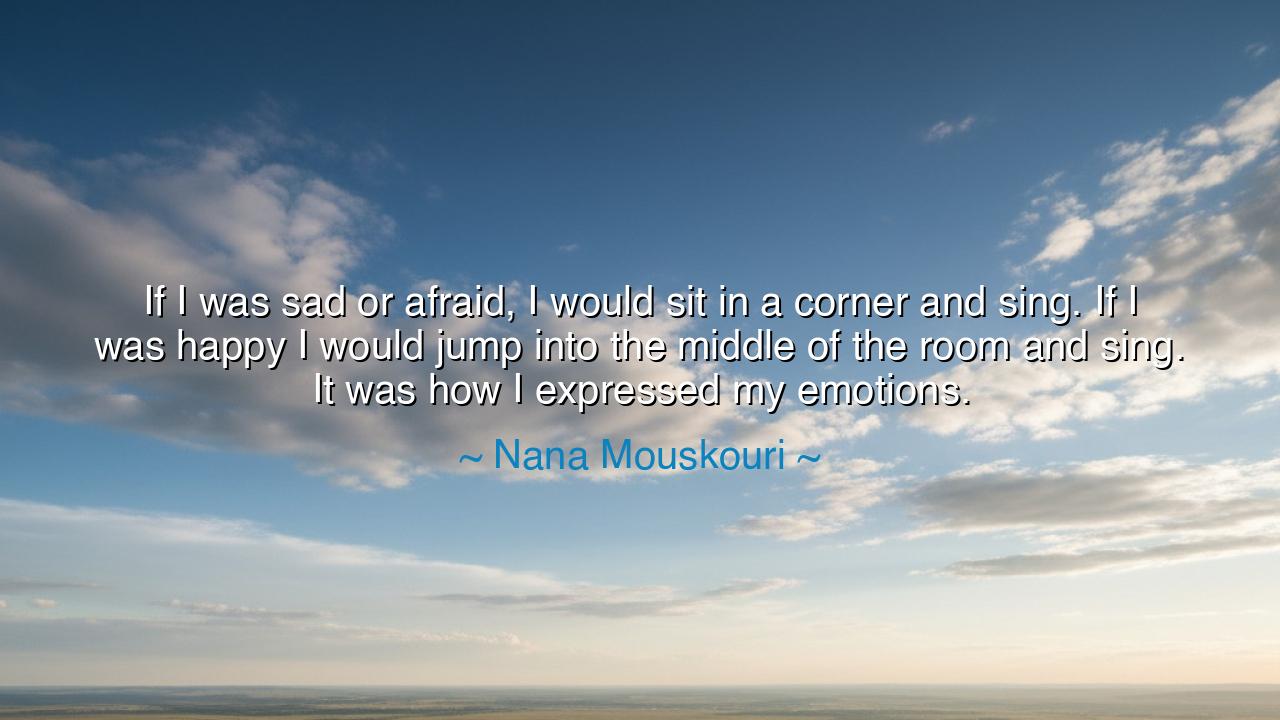
If I was sad or afraid, I would sit in a corner and sing. If I
If I was sad or afraid, I would sit in a corner and sing. If I was happy I would jump into the middle of the room and sing. It was how I expressed my emotions.






The words of Nana Mouskouri, “If I was sad or afraid, I would sit in a corner and sing. If I was happy I would jump into the middle of the room and sing. It was how I expressed my emotions,” are a hymn to the eternal power of expression, the sacred act by which the soul transforms its feelings into beauty. In these few lines, Mouskouri reveals a truth that has resonated through all ages—that the voice, when lifted in song, becomes both shield and sanctuary. Whether born of sorrow or joy, her singing was an act of survival, a way to make peace with the world and with herself. She reminds us that music is not merely sound—it is the language of emotion, the breath of the spirit that turns pain into poetry and fear into freedom.
Mouskouri’s life gives depth to her words. Born in Greece during a time of hardship and political unrest, she found in music the only refuge that could not be taken from her. When she sang, she did not escape reality; she transfigured it. Her voice carried both the tremble of fear and the glow of hope, binding opposites together in harmony. In this sense, her quote is not merely personal—it is philosophical, echoing the belief of the ancients that art is the soul’s way of restoring balance when the heart is torn between darkness and light. Like the lyre of Orpheus, her singing had the power to calm chaos, to turn grief into grace.
The ancients believed that all emotion sought release, and that to suppress it was to invite sickness of the soul. The philosopher Aristotle, writing of tragedy, taught that art brings catharsis—a purging of emotions that heals rather than harms. Mouskouri’s practice of singing, whether in sadness or joy, follows the same sacred principle. In her sorrow, she sang softly, as if to cradle her own heart; in her joy, she sang boldly, to share the light within her. In both states, the act of singing was her bridge between the inner world and the outer one. It was how she remained whole.
There is a quiet heroism in her words, for they speak to a universal truth: that those who learn to express their feelings through creation—through art, writing, song, or craft—find a way to transform their suffering rather than be consumed by it. Many of history’s great souls have known this secret. Consider Ludwig van Beethoven, who, deaf and tormented, composed music that continues to echo through eternity. His hearing failed, yet he heard within himself a deeper music—the voice of his own endurance. Like Mouskouri, he turned isolation into expression, despair into transcendence. Their art did not erase their pain; it gave it form, and through form, meaning.
Mouskouri’s reflection also reminds us that emotion is not weakness, but energy—a force that, when properly channeled, becomes creation. To sing when sad is an act of courage; to sing when joyful is an act of gratitude. Both require openness, a willingness to let the heart speak without fear of judgment. In the modern world, many have forgotten this sacred art of emotional honesty. We hide pain behind silence, or bury happiness under restraint. Mouskouri’s words call us back to the ancient rhythm of the soul—to live and express without fear, to let the voice mirror the heart’s truth.
There is also tenderness in her image of the child sitting in the corner, singing quietly to herself. It is the image of the inner child that lives in every human being—the part of us that seeks comfort, not through words, but through creation. When she says she “jumped into the middle of the room and sang,” she describes the moment when the spirit breaks free of fear and celebrates its own existence. That moment is holy. It is the soul dancing in the temple of the body. It is the reminder that self-expression is not vanity—it is vitality, the very act of living fully.
So let this teaching be passed down: express, and you will endure. Do not silence your emotions, for they are sacred messengers. Whether your heart is heavy or light, give it a voice. Sing, paint, write, move—whatever your form of expression, let it flow. In doing so, you will transform your fear into strength and your sorrow into wisdom. As Nana Mouskouri teaches through her gentle wisdom, life’s emotions are not enemies to be conquered, but notes in a divine song. The soul that learns to sing through every season—dark or bright—has found not only healing, but harmony with existence itself.






AAdministratorAdministrator
Welcome, honored guests. Please leave a comment, we will respond soon